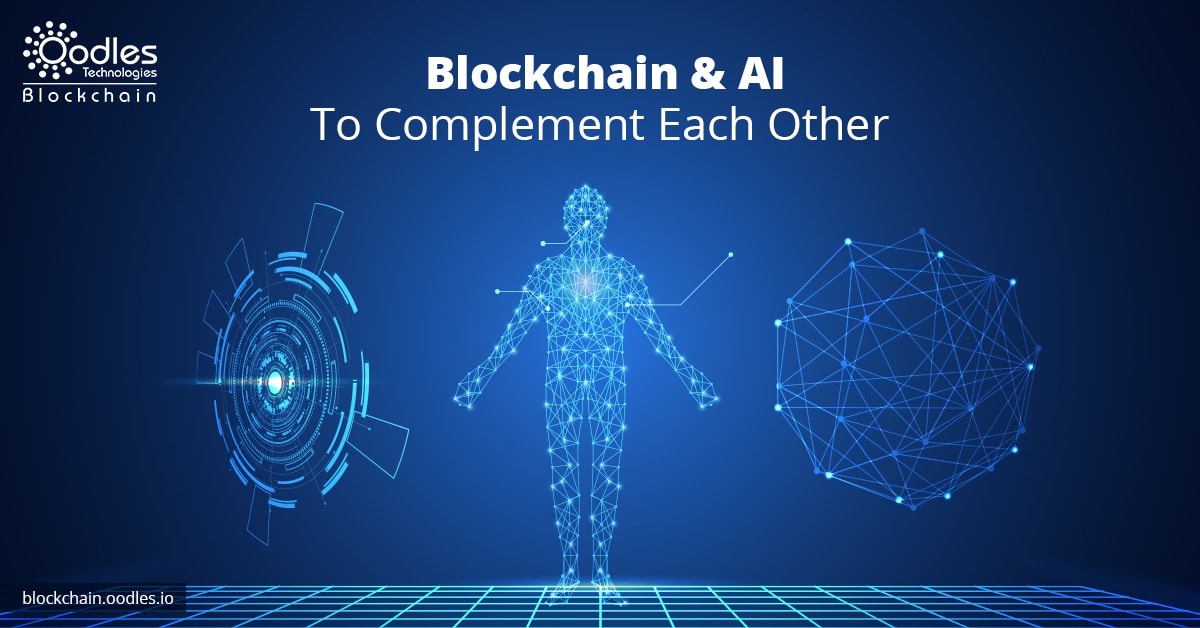-
How do the two most revolutionary concepts like Blockchain and Artificial Intelligence complement each other? In this article, we discuss the merits of using blockchain alongside blockchain for improved security and better results.
Blockchain has created such a buzz in the tech scene that almost every technology enthusiast wants to know more about it. Not only has it brought a rage of cryptocurrencies, but also is about to revolutionize various industries like Healthcare, Education, E-commerce, and the Digital Space, by bringing the concept of decentralization to realization. And the focus of blockchain development companies is now on integrating AI with blockchain to expedite its widespread adoption in the world.
Blockchain technology::
The blockchain is a distributed ledger that stores all transactions in a digital and decentralized manner. It uses chronological order to store the complete transaction details in blocks.
Each connected computer to the network is called a node. As the blockchain is distributed, a copy of the blockchain automatically gets downloaded on each node. Thus, all nodes get access to the database, but the contents remain encrypted.
Get an overview of decentralized finance (DeFi) and its growing impact.
Let's understand it with a simple explanation here:
- When someone makes a transaction request, it gets broadcast to a P2P (peer2peer) system of nodes.
- The network of nodes verifies the transaction using cryptographic algorithms.
- This transaction gets combined with others to form a block of information.
- The newly added block gets added to the current block in a way that it stays connected to the previous block.
- The transaction is now concluded.
Artificial Intelligence::
Machines and computers are of no use until humans induce them with programs and software to make them run as per the instructions. Artificial intelligence is one of the latest phenomena, science, or technique in which machines are programmed to act like humans. They are coded to take independent decisions.
How do AI and blockchain go hand in hand?
Conceptually, both AI and blockchain have different characteristics. AI is centralized, and its results depend on the probability. The intermittent black box (complex algorithm process) is placed between the input and output and is usually not revealed.
On the other hand, the data in a blockchain remain decentralized and transparent. Whatever data you store on a blockchain stays secure and unaltered due to the use of cryptography. Blockchain ledger timestamps all of the stored data and then is distributed among the nodes or participants.
Discover how dynamic NFTs are changing ownership and digital identity.
AI and blockchain can uplift each other and help in getting better outcomes.
AI and Blockchain, for Data effectiveness through Security:
AI works on data correctness to master its algorithm and final results.
Blockchain keeps data secure ensuring no data tampering. Then, encryption is used in a way that makes data stored in a blockchain unalterable. This secure data means 'data correctness' which helps create better AI models and provide better results.
With this organized data, blockchain creates new markets for transparent data exchange. And thus, helps in providing extended data access and an improved data monetization model.
Explore semi-fungible tokens and their role in digital assets.
Blockchain for wide-range data accessibility::
Artificial Intelligence depends on data. Nonetheless, only a handful of established corporations like Google, Microsoft, or Facebook have access to their data. This data is not revealed to the outer world.
But the blockchain, being a peer-to-peer connection, allows anyone to access data available on the network, thus, making the availability within everyone's reach easily.
Improved data management::
As for now, AI follows the concept of a centralized database. It means, in case of an accident, data might get altered, lost, or corrupted.
However, when we blockchain, the gets stored in millions of nodes. Data in multiple copies means it won't ever be lost.
Learn how to set up TLS authentication for monitoring tools.
Data sharing and scalability::
Expecting better results from AI means it requires chunks of correct data.
Blockchain can help AI store and process that chunk of correct data, thus creating a scalable blockchain ledger. Unquestionably, it a tough task but worth exploring.
With blockchain, we can share and sell data in a secure manner. Further, various data exchanges to securely trade data help get more data inputs to the AI-based machines.
Don’t forget to enable two-factor authentication for data protection.
AI's Dependency on Blockchain::
Although blockchain has immense potential, it does have some pitfalls, which can be overcome by the effective use of AI.
- One of the issues with blockchains is mining. It consumes a lot of money and energy to mine. Here, AI can help optimize energy consumption and lower the investment cost in mining hardware.
- The blockchain is growing speedily. 1MB is being added every 10 minutes. AI can help enhance the blockchain by removing unnecessary data.
- Blockchain security can be improved by AI deployment.
- If the blockchain data is sold to a company, tracking how that company is using it, granting access, and other things can be possible with AI.
AI and blockchain are the two most trending technologies in the digital landscape. Both contain the immense potential to become the path-breakers when used together.
Read this beginner-friendly guide to testing blockchain apps for practical insights into early development strategies.

Our Offices
INDIA
Emaar Digital Greens, Sector 61,
Gurugram, Haryana
122011.
Welldone Tech Park,
Sector 48, Sohna road,
Gurugram, Haryana
122018.
















